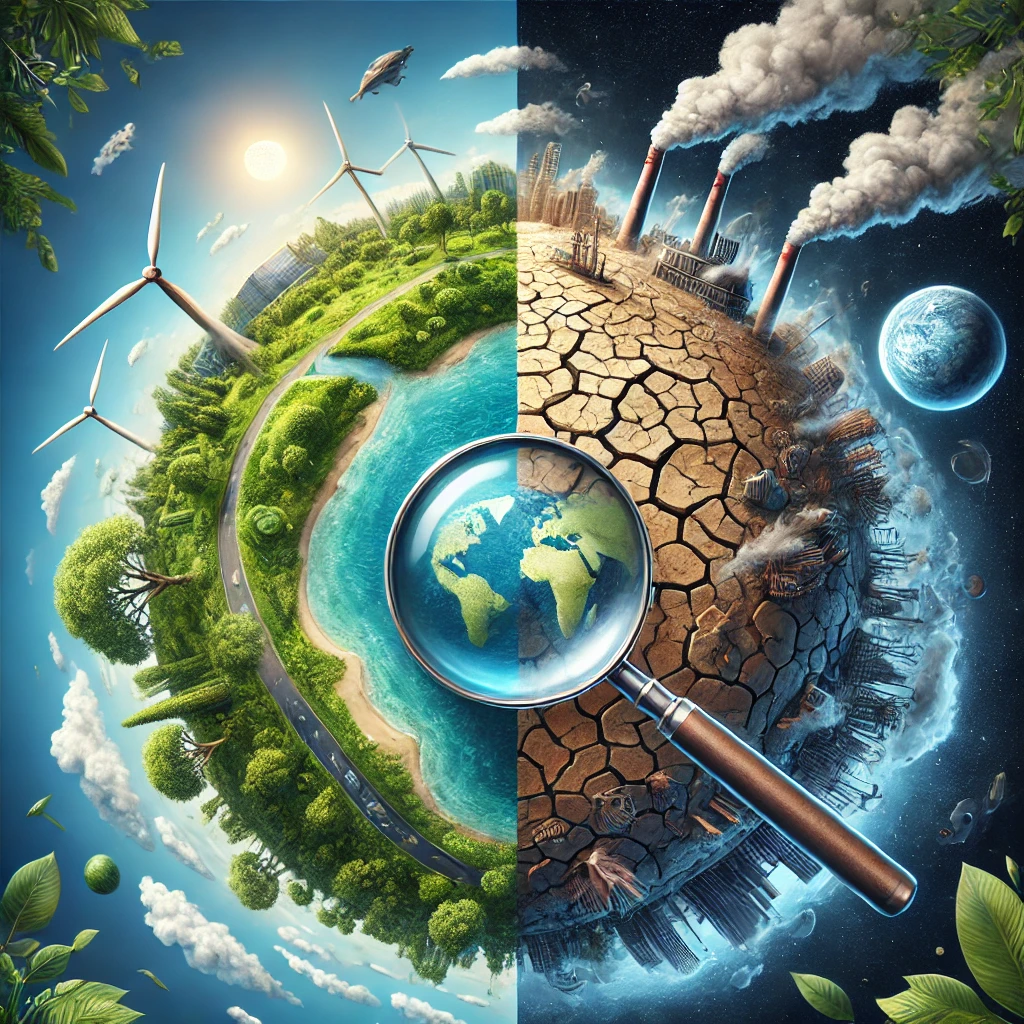Climate change is one of the most significant challenges humanity faces, yet there are still many preconceived ideas and misconceptions surrounding it. These myths often hinder progress by fostering doubt and skepticism about the need for action. In this post, we’ll debunk some of the most common climate change misconceptions, shedding light on the scientific facts and offering a clearer understanding of the issue.
1. Myth: Climate Change Is Just a Natural Cycle
Fact: While it’s true that Earth’s climate has changed naturally over millions of years, the current rate of global warming is unprecedented. Since the Industrial Revolution, human activities—like burning fossil fuels and deforestation—have rapidly increased greenhouse gas emissions, causing the planet to warm much faster than any natural cycle.
According to the Intergovernmental Panel on Climate Change (IPCC), the past 150 years of warming cannot be explained by natural factors alone. The sharp rise in CO2 levels is directly linked to human activities.
2. Myth: It’s Cold Outside, So Global Warming Must Be Fake
Fact: Weather and climate are not the same. Weather refers to short-term atmospheric conditions, such as daily temperatures, while climate describes long-term patterns over decades or centuries. Just because it’s cold today doesn’t mean climate change isn’t happening.
Global warming refers to the overall rise in Earth’s average temperature, which can lead to more extreme weather events, including colder winters in some regions due to disrupted atmospheric patterns like the polar vortex.
3. Myth: Scientists Don’t Agree on Climate Change
Fact: There is overwhelming scientific consensus about human-caused climate change. 97% of climate scientists agree that climate change is real and driven by human activities. This agreement is based on decades of research and peer-reviewed studies from around the world.
Prominent organizations like NASA, the World Meteorological Organization (WMO), and the National Oceanic and Atmospheric Administration (NOAA) have all confirmed that human-induced global warming is a fact.
4. Myth: Climate Change Only Affects Polar Bears and Ice Caps
Fact: While melting ice caps and endangered polar bears are highly visible symbols of climate change, its impacts are global and affect every aspect of life on Earth. Climate change leads to:
- Rising sea levels that threaten coastal communities.
- More frequent and intense natural disasters, such as hurricanes, floods, and wildfires.
- Heatwaves and droughts that disrupt agriculture and water supplies.
- Health impacts, including the spread of diseases due to changing temperatures.
Everyone is affected by climate change, directly or indirectly, from food security to economic stability.
5. Myth: Renewable Energy Is Too Expensive and Unreliable
Fact: The cost of renewable energy has dropped significantly in recent years, making it one of the most affordable and reliable sources of power. Technologies like solar and wind power are now cost-competitive with fossil fuels in many parts of the world.
In fact, renewable energy sources are not only cheaper but also help reduce reliance on finite resources like coal and oil. Countries investing in renewable energy are creating millions of new jobs while contributing to a cleaner, more sustainable future.
6. Myth: Individual Actions Don’t Make a Difference
Fact: While large-scale policy changes are essential, individual actions can collectively have a significant impact on reducing carbon emissions. Simple changes like:
- Reducing energy consumption by turning off lights and unplugging devices.
- Using public transport or walking instead of driving.
- Eating a plant-based diet or reducing meat consumption.
- Recycling and reducing waste.
These actions may seem small, but when adopted by millions of people, they contribute to significant reductions in emissions and environmental damage.
7. Myth: It’s Too Late to Do Anything About Climate Change
Fact: While climate change is already affecting the planet, it’s not too late to take action and limit the worst effects. Immediate action can still make a substantial difference in mitigating future impacts. According to the Paris Agreement, we must aim to keep global temperature rise below 1.5°C to avoid catastrophic consequences.
Technologies like carbon capture, renewable energy expansion, and sustainable agriculture are key solutions. Individual efforts, combined with international policies, can help slow down global warming and protect the planet for future generations.
8. Myth: Climate Change Is a Political Issue
Fact: Climate change is a scientific and environmental issue, not a political one. Although political policies can influence how we respond to the crisis, the evidence supporting climate change comes from scientific research, not political agendas.
Climate action is about ensuring the long-term sustainability of our planet, regardless of political affiliation. Working together across all sectors—from governments to businesses to individuals—can create effective solutions for a healthier planet.
9. Myth: Technology Will Fix Climate Change on Its Own
Fact: While technological innovations like carbon capture and clean energy are crucial, they are not a silver bullet. Technology alone cannot solve climate change; it requires systemic changes in behavior, policy reforms, and global cooperation.
Relying solely on future technology delays the urgent need to act now. We must combine sustainable technologies with lifestyle changes and policy measures to combat the climate crisis effectively.
Conclusion: Climate Change Is Real, and We Can All Make a Difference
Climate change is a complex issue, but understanding the facts over myths is crucial to making informed decisions. By debunking these common misconceptions, we can shift the conversation towards action and solutions. Everyone has a role to play in addressing climate change, from making eco-friendly choices to supporting policies that promote sustainability.
Let’s work together to ensure a healthier, safer planet for future generations.
FAQ
Q1: What are the main causes of climate change?
Climate change is primarily caused by human activities, including the burning of fossil fuels, deforestation, and industrial processes, which increase greenhouse gas emissions.
Q2: What can individuals do to help combat climate change?
Individuals can reduce their carbon footprint by conserving energy, using renewable energy sources, recycling, reducing meat consumption, and supporting sustainable practices.


5 thoughts on “Climate Change Preconceived Ideas: Debunking Common Myths and Misconceptions”